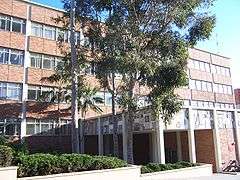UCLA College of Letters and Science
The UCLA College of Letters and Science (or simply UCLA College) is the arts and sciences college of the University of California, Los Angeles (UCLA). It encompasses the Life and Physical Sciences, Humanities, Social Sciences, Honors Program and other programs for both undergraduate and graduate students.

| Motto | Fiat lux Let there be light |
|---|---|
| Type | Public |
| Established | 1919 |
Parent institution | University of California, Los Angeles |
| Dean | Humanities: David Schaberg Life Sciences: Victoria Sork Physical Sciences: Miguel Garcia-Garibay Social Sciences: Darnell Hunt Undergraduate Education: Patricia A. Turner |
| Location | , |
| Campus | Urban |
| Mascot | Bruins |
| Website | College website |
The bulk of UCLA's student body belongs to the College, which includes 34 academic departments, 21,000 undergraduate students, 2,700 graduate students and 900 faculty members. Virtually all of the academic programs in the College are ranked very highly and 11 were ranked in the top ten nationally by the National Research Council.
The College originated on May 23, 1919, the day when the Governor of California (William D. Stephens) signed a bill into law which officially established the Southern Branch of the University of California. At that time, a College of Letters and Science (named after its northern counterpart at Berkeley) was established as the university's general undergraduate program and it began to hold classes the following September with only 250 students in the college.
At its inception, the College originally offered only a two-year program, making it a glorified junior college. Young people interested in four years of college were required to proceed to the Berkeley campus or other universities to attend upper-division courses. The inferior two-year program was intolerable to the many Southern Californians who had fought to establish the southern branch. They vigorously lobbied the Regents of the University of California for a third year of courses at the southern branch, which was then followed by demands for a fourth year. The Southern Californians ultimately prevailed, and in 1925, the College awarded its first bachelor's degrees. A milestone occurred in 1927 when the southern branch was officially renamed the University of California at Los Angeles (UCLA), although UCLA would have to wait until 1951 to achieve de jure coequal status with UC Berkeley and 1957 to achieve true de facto equality.
Divisions
The college is divided into four divisions — Division of Humanities, Division of Life Sciences, Division of Physical Sciences, and Division of Social Sciences.
Division of Humanities
Applied Linguistics, Art History, Asian Languages & Cultures, Classics, Comparative Literature, English, French & Francophone Studies, Germanic Languages, Italian, Indo-European Studies, Law and Philosophy Program, Lesbian, Gay, Bisexual, and Transgender Studies, Linguistics, Musicology, Near Eastern Languages & Cultures, Philosophy, Study of Religion Major, Scandinavian Section, Slavic Languages & Literatures, Spanish & Portuguese, Writing Center and Writing Programs,
Division of Life Sciences
Psychobiology, Computational and Systems Biology, Ecology and Evolutionary Biology, Microbiology, Immunology & Molecular Genetics, Molecular, Cell and Developmental Biology, Molecular, Cellular and Integrative Physiology, Neuroscience, Psychology, Physiological Science.
Division of Physical Sciences
Atmospheric and Oceanic Sciences, Chemistry and Biochemistry, Earth and Space Sciences, Mathematics, Physics and Astronomy, and Statistics
Division of Social Sciences
Afro-American Studies, Anthropology, Archaeology, Asian American Studies, Chicana/o Studies, Communication, Economics, Geography, History, Human Complex Systems, Political Science, Sociology, Gender Studies

Alumni
- Kay Ryan, English, 16th poet laureate of U.S.[1]
- Brad Delson, "Linkin Park" member
- Richard Heck, 2010 Nobel Prize in chemistry
- Paul Terasaki, organ transplant medicine and tissue typing
Notable faculty
- Utpal Banerjee, Department chair and professor of molecular, cell and developmental biology; professor of biological chemistry, American Academy of Arts and Sciences
- Jared Diamond, professor of geography, American Academy of Arts and Sciences, National Medal of Science recipient and MacArthur Fellowship (1985)
- Alessandro Duranti, professor of anthropology, American Academy of Arts and Sciences
- Andrea Ghez, MacArthur Fellowship[2] (Genius Grant winner, 2008), professor of physics and astronomy
- Thomas M. Liggett, professor of mathematics, National Academy of Sciences
- Thom Mayne, Professor of architecture, American Academy of Arts and Sciences
- Calvin Normore, Professor of philosophy, American Academy of Arts and Sciences
- Theodore Porter, Professor of history and department vice chair for undergraduate affairs, American Academy of Arts and Sciences
- Charles Ray, Professor of sculpture, American Academy of Arts and Sciences
- Saul Friedländer, MacArthur Fellowship (1999)
- Debora Silverman, Professor of history and art history, American Academy of Arts and Sciences
- Terence Tao, Fields Medal–winning mathematician, National Academy of Sciences,[3] MacArthur Fellowship[2](2006)
- Paul Terasaki, organ transplant medicine and tissue typing
Commencement ceremonies
The main graduation commencement ceremony for the College of Letters and Science is held annually on a Friday night in June in Pauley Pavilion. For two years in a row, the scheduled commencement keynote speaker had canceled the engagement. Bill Clinton canceled in 2008 for not wanting to cross a picket line. Actor and alumnus James Franco canceled in 2009 because of his filming scheduling conflicts. Rock band Linkin Park's Brad Delson accepted the last minute invitation to speak at the 2009 commencement ceremony.[4][5]
- June 11, 2010 – Columnist Gustavo Arellano of '¡Ask a Mexican!'
References
- College of Letters and Science
- "UCLA astronomer Andrea Ghez named a 2008 MacArthur Fellow". UCLA. Retrieved 2008-09-23.
- Professors named to National Academy of Sciences
- Linkin Park's Brad Delson to keynote UCLA commencement, June 5, 2009
- Larry Gordon, "Rock star to replace actor for UCLA commencement speech", Los Angeles Times, June 9, 2009